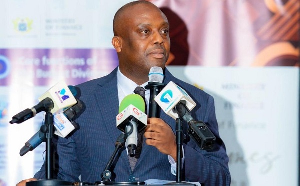NDC & NPP Should Put Politics Aside and Rethink through the Current System of Pre-University Education in Ghana.
Reference: Ghanaweb “General News of Sunday, 18 November 2012..... Source: GNA”; Caption: “More qualified SHS graduates to remain at home – Prof Yakubu”
By: Otchere Darko
Readers who did not read the content of the Ghanaweb news report of above reference are advised to read it at Ghanaweb archived news to fully appreciate the gravity of the warning by Professor Yakubu. Why are we allowing party politics to ruin the future of our children? Where on earth, apart from Ghana, does a Secondary School student use only three [or even four years] to study and then after that qualify to go to university? I am not an educationist, but I have a reasonable amount of knowledge to conclude that the three or four years allocated for Secondary School education in Ghana is woefully inadequate. I would love to know whether there is any reader [of this article] who knows of any [successful] country in the world that has a system of Secondary education that lasts for only three years or even four years, and where the end-products of the system get admitted into universities in that country.
Before the current Rawlings’ system of pre-university education was introduced, Ghanaian children took a total of seventeen years to exhaust this level of education. That system started with a six-year primary school education from Primary class one (P1) to Primary class six (P6). After the primary school level of education, a school child progressed automatically to a four-year Middle School that consisted of Middle form one, form two, form three and form four. While at the Middle School, those who wanted to go to Secondary School sat for the Common Entrance Examination in either Middle form two or form three or form four, before those whose passed got admissions to Secondary Schools to start what was then Secondary form one, progressing from there to Secondary form two, form three, form four and finally to form five (S1, S2, S3, S4 and S5), where they all sat for the GCE ‘O’ level. Those who obtained the minimum Sixth Form entrance requirements proceeded from Secondary form five to “Sixth Form” that had lower and upper classes. Secondary School students who excelled themselves in both the ‘O’ and ‘A’ level GCE examinations qualified to go to University. It should be noted that, even though the entrance from Secondary form five to “Sixth Form” was not automatic, the last two classes were collectively called “Sixth Form”; and both were part of the Secondary School level of education.
Today, after Junior High School, some children qualify to go to Senior High School that lasts for either three years only, [according to the NDC SHS scheme], or four years, [according to the NPP SHS scheme that has been dropped by the current NDC administration]. After three or four years of SHS education, those who get the required grades qualify for admission into one of Ghana’s public universities or other tertiary institutions. It is no wonder, therefore, that SHS graduates who exit Ghana’s educational system to pursue tertiary education elsewhere abroad are not accepted by [good] foreign universities, unless they (the Ghanaian SHS graduates) do “A” level courses, or sit for some other pre-university examinations in those countries before they (such Ghanaian SHS graduates) are given admissions to do courses in [good] foreign universities. When Rawlings abolished the Middle School system, many Ghanaians were very happy, because the British people who brought that level of education to Ghana do not have it anywhere in the United Kingdom. However, removing the Middle School system of education and replacing it with a Junior High School system that is not part of Secondary School education is nothing less than a “monumental educational policy mistake” on the part of those who advised Rawlings to do it.
*It is clear that such drastic cutting down of the duration-period for Secondary education from seven years to three or four years can only lead to an end-product that can never be equal to the end-product of the first system. The two promises by the two dominant parties that NDC will bring free SHS education after 2016 while NPP will start it after 2012 are both are brilliant ideas that all Ghanaian parents welcome. However, if Senior High School education was a human being, it would be said to suffer from poliomyelitis, because the loss of half of a previous size of anything creates an “abnormal” situation. The entire pre-university system of education in Ghana has, thus, become a complete shamble. *Prof Yakubu is calling for “funds from government...... to allow the universities [to] adequately prepare to provide the needed facilities and infrastructure to accommodate the [two batches of] students”. In the short term the Government must heed the call of Professor Yakubu and try and solve this problem, which has been its own making. *In the longer run, the entire Secondary School system in Ghana must be rethought through by both NDC and NPP, with the aim of improving and making it serve the nation better.
I have proposed before, and still propose now that the current Junior High Schools should be made part of Secondary School education in Ghana, to create a 13-year or 12-year pre-university level of education made up of a six-year Primary School, plus a four-year Junior High School, plus a final three-year or two-year Senior High School, as we think necessary. Currently pre-university education in Ghana lasts 12 years. Making Junior High School part of Secondary education is better than keeping it as it is presently, where it has become part of elementary school education. *Any changes in the system of education should, however, not be made suddenly as NDC and NPP have been doing every time there is a change of Government. Changes of this nature should be programmed to take more than seven years to come into effect, so that two batches of school leavers do not find themselves completing school in the same year as it has happened now. Prof Yakubu’s warning should give NDC and NPP politicians cause to put their heads together and “rethink”, in the interest of the millions of Ghanaian school children and their parents.
Source: Otchere Darko
Opinions of Monday, 19 November 2012
Columnist: Darko, Otchere














